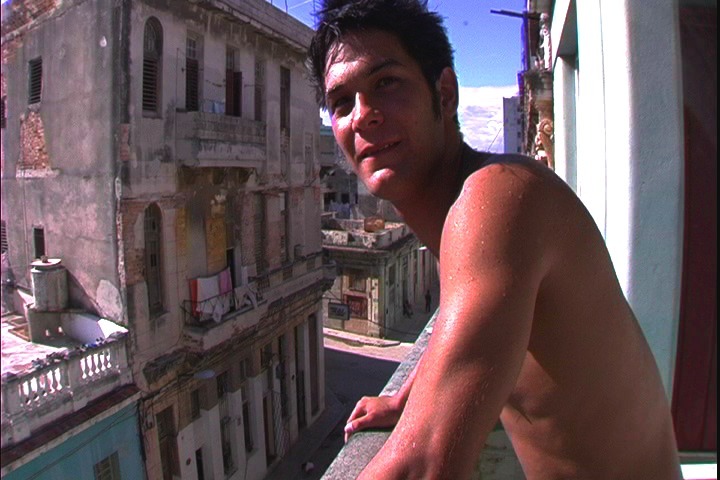
Cuban Underground
Written by Nikki Chase | Posted by: Anonymous
The documentary provides a glimpse into the lives of four hustlers trying to make a living in Havana’s gay underground. The film combines footage of their lives on the streets with informal interviews to offer an unequalled look at same-sex prostitution in Cuba.
Stout says she’s always had an "obsessive passion" for watching films, but it wasn’t until she took a job teaching high-risk teens to use film as a means to portray their life-struggles, that she first discovered her passion for making them. "I saw the power of video to tell marginalized stories to a wider audience and knew that I wanted to pursue filmmaking," she says.
During her time in the Ph.D. program in anthropology at Harvard, she fought her way into a popular undergraduate non-fiction film production course. "I made a horrible final project, with tons of jump cuts and bad lighting," Stout says. But she took what she learned and shot a short in Cuba, which won her a fellowship at the Film Study Center at Harvard. This allowed her to take the time to find her style and develop her tastes through classes with visual anthropologist, Lucien Taylor and filmmaker and queer theorist, Isaac Julien. And, it was during this fellowship that she produced Luchando.
Nikki Chase: How did you come upon the topic for Luchando?
Noelle Stout: I think I said it best in my director’s statement: In the summer of 2001, I visited Cuba to study at the University of Havana and I was caught in a police raid of an underground gay party. As I sat squished in the backseat of a 1957 Chevy barreling back toward Havana, I realized that Cuba’s gay enclaves were in the midst of a critical transition. I returned in 2002 with the hope of laying the groundwork for a film that explored how the social crisis in Cuba, after the fall of the Socialist Bloc, had affected the everyday lives of gay Cubans.
What I found as I developed closer personal relationships, was a community deeply and irrevocably affected by the wide scale emergence of same-sex prostitution. Macho, young Cubans from the countryside were flooding Havana’s gay scene to have sex for Nike tennis shoes. Travestis were transforming their bodies with hormones paid for by foreign tourists. Lesbians were having sex with men to support their lovers. Cuba’s gay culture had become overwhelmed with the presence of the sex trade. I knew this was the story I needed to tell.
NC: What drew you to this subject?
Stout: As a queer filmmaker, I had a personal stake in sharing the story. During my research I also confronted so much propaganda about Cuba, from both the right and the left. It’s impossible to tell a story without becoming part of that political dynamic, but I wanted to move away from Castro to focus on the everyday realities of Cubans.
Most importantly, I was blown away by how bravely gay Cubans faced the police and how they really took care of one another. In this environment with so much affection, even between strangers, I saw gay friends struggle with their relationships with hustlers. I realized that you can honestly love someone and yet still be using them for your own survival. I think a lot of us have faced that tension somewhere in our lives.
NC: How did you come in contact with the four subjects for the film?
Stout: Almost all of my relationships in Cuba can be traced back to the Malecon. That’s the sea wall along Havana’s tourist district where gay Cubans and hustlers gather every night. I literally sat on that wall night after night for months talking to people. Cubans are really open, especially hustlers, because they see a foreign woman and immediately start to work, so I trusted that I would find the right subjects. I shot six, and used four stories. I knew that the film would largely rest on the charisma of the characters because technically it was difficult. I was shooting by myself with no big microphones or lights, because of the risk of getting caught, so I needed them to carry the story.
NC: Was it hard getting them to open up to you?

Always performing…
[Click to enlarge]
Stout: They had to really trust me and the only way to get beyond being a tourist was to stick around and show my investment in their lives. I spent my first four months, all day, everyday with La Gorda. She is so layered that what I thought was openness in the beginning, months later I recognized was her hustle. I became the closest to her, too close perhaps, because when I moved on to film other characters we had a huge falling out. She was drunk and started a fight with me in the middle of the street one night. Mutual friends pulled her away, but we didn’t talk for weeks. I realized that I didn’t need to become everyone’s best friend in order to film them with sensitivity.
It was also a challenge getting the men to really open up to me. As a foreign woman, at first they saw me as a potential client. I was living with my girlfriend at the time (an American medical student who traveled with me and worked at a Cuban clinic in our neighborhood) so they eventually let go of the idea that I would hire them to be my boyfriend. But gender performativity runs deep in Havana, and I came to accept that they would always have some level of a façade. I tried to find male hustlers whose performance didn’t change when the camera was rolling. Yuris, for instance, comes across false at times, but that’s the same performance he uses when the camera is off. In his mind, he’s always got an audience. That was the reality, so I captured it rather than fighting it.
NC: You were in Havana, Cuba for almost two years in an attempt to integrate yourself into this culture, how close did you get to the subjects and how involved were you in the hustling circles to which they belonged?
Stout: There is no way I could have captured their lives without being totally integrated. There is so much irresponsible journalism about the island. I see reports on CNN of Cuban prostitutes and they use B-roll of women waiting for taxis and use a voiceover explaining how sex work is everywhere. Those aren’t hookers, those are women in tight outfits waiting for the bus. I’ve spent 19 months in Cuba, and the entire 2003-2004 year in Havana to get beyond this superficial, sensationalist look at sex work. It is easy to misunderstand Cuban realities because there is strict tourist segregation in Cuba. Foreigners have separate housing, taxis, stores. Cubans aren’t allowed to stay in tourist hotels. Getting beyond the segregation line meant living even the most mundane details of their lives with the characters. As the film shows, nothing was off limits.
NC: Your filming was eventually cut short after you were detained by the police for filming. What were you charged with and how long were you held? What was that like?
Stout: The Cuban government forbids any filming not approved by state agencies. It is also illegal to do journalism without prior approval. Even though I wasn’t aiming to make a political project, I was pretty confident that I wouldn’t get permission to film, so I never applied for the permit. This meant that I had to hide the camera every time a police officer appeared. It made filming on the street especially difficult. I would stuff the camera in a shoulder bag every time I saw a police officer. The Cubans I was filming were incredibly adept at sensing when an officer or undercover agent may be watching and I followed their cues. If I thought I could get away with playing the dumb tourist, I would keep filming, but mostly we ended up with a lot of footage of the inside of my bag.
I was arrested during my last trip in March 2007 for filming on the street. After filming all day, I arrived at a Cuban friend’s apartment when a neighbor ran to tell us that the police were coming. An officer in uniform and three undercover policemen arrived and demanded to see the camera. The undercover cops were all under the age of 30, dressed like hustlers or everyday Habaneros that drove cabs or sold black market goods. "We’ve been following you all day," the youngest one wearing a basketball jersey and baggy shorts explained, "We need to see those tapes." I told the officer I was making a home video for my mom to see my life in Havana.
Moments later I found myself stuffed into the back of a tiny, white soviet-style Lada police car. There were no handles on the insides of the doors and the windows didn’t roll down, which trapped the thick, musty heat in the backseat. As we drove to the station, I realized that film was done. We drove over a drawbridge and into what had been a fortress during Cuba’s colonial period. They led me into a questioning room. The more questions they asked, the more I sounded like an American creating anti-state networks of dissidents on the island. "Where are you from?" The United States. "How many times have you been to Cuba?" Fifteen or sixteen, I answered. "Your Spanish is good, why the Cuban accent?" they asked. I learned here, I replied.
The officer’s computer had to finish printing before the he could look me up in the immigration database. He looked at me watching the 1980s-style printer and without cracking a smile said, "Underdevelopment because of your embargo." Things weren’t going well. Eventually, my photograph came up in the database. Two military officers had intended to review my tapes more closely but a policeman came into the room and told everyone that they were missing an important meeting. I was released, camera in hand. Cuban security forces have dealt with decades of terrorism against Cuba by radical Cuban Americans in Miami, including bombings in hotels. I sympathized with the goals of the revolutionary government, and in a way I was relieved that despite their economic crisis they still had control over their borders.
NC: Eventually, you were forced to leave due to tensions between Cuba and the Bush administration, what was it like to be an American in Cuba during that time?
Stout: Confusing. There are always rumors about U.S. invasions and new anti-Cuban laws, so it’s difficult to find information about what’s happening. I eventually received an email from Harvard telling me that the Bush administration wasn’t going to renew Harvard’s education license to travel to Cuba and it was time to come home. Bush’s tightening of the antiquated embargo policy has been a total disaster.
NC: Do you have any plans for future films?
Stout: I’d like to do another project in Cuba, but I’m not sure I can get in the country now that the film is out. My producer Alphonso Morgan and I are in pre-production on a new project but I’m not supposed to talk about it yet. All I can say is that it involves men in spandex and this time I won’t be hiding my camera in my purse.
Luchando screens at the Boston Latino International Film Festival this month. Visit www.bliff.org or www.luchandofilm.com for further information.









